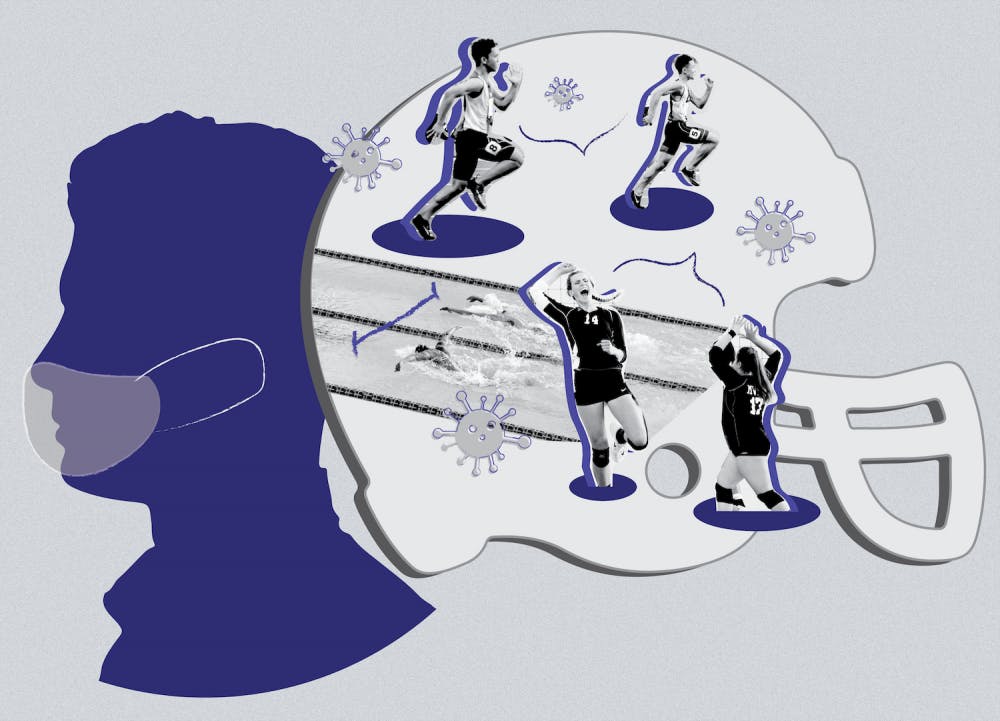Wide shot. Pan left to a young girl in a Gators beanie on the pediatric oncology floor of her local children’s hospital.
It’s me, just shy of three years ago.
Three years of distance between my Stage II cancer diagnosis and me makes reflection on that time in my life feel like a detached recollection of a genreless movie rather than a remembrance of things that actually happened to me.
My list of what I imagine to be Post-Traumatic Stress Disorder triggers is relatively short: Lingering scrapes and bruises, biannual wellness exams and random, damning thoughts succeed all too well at pulling me from the silver screen in my mind and dropping me—hard—into those watershed memories just as I experienced them.
But recently, another trigger has procured itself a spot on my list: COVID-19.
I’m a high-risk college student. Specifically a high-risk sports reporter, monitoring the developments in fall sports news, and the virus has been an unrelenting source of stress for me lately. On one hand, I love college sports. My job depends on college sports. More importantly, these student athletes bust their asses all year long for their sports and deserve the chance to play this season.
On the other hand, what about the risks? Avid “sports fans” (I used quotations because I do not consider anyone who puts their desire for entertainment above the well being of athletes a true sports fan) have explained in 280 characters or fewer how college athletes should have no problem playing this year because they “probably won’t die” should they test positive for the virus. To those anonymous Twitter “eggheads”, I say “wake up.”
While not of the same caliber as Florida’s student-athletes are at their respective sports, I was a varsity swimmer practicing about 15 hours a week and in the best shape of my life when I was diagnosed with Intermediate Hodgkin’s Lymphoma my junior year of high school. Research and developments in treatment plans suggested that I had about an 85 percent chance of living at least five years post-cancer. I was still scared shitless.
Similar to what medical experts in the SEC, ACC and Big 12 are telling all of these football, soccer and volleyball players—among others—staring the prospect of competing during a pandemic right in the face, my oncologist assured me that our main concern with my treatment was mitigating and reducing the risk of lasting side effects (and in my particular situation, the development of secondary cancers). My long-term health defect was infertility, which I underwent an in vitro fertilization cycle complete with egg retrieval, freezing and storage to counteract this summer. For student-athletes and COVID-19, theirs is myocarditis. Their counteractive measure is opting out this fall.
According to the Hartford Healthcare Medical Group, myocarditis is “an inflammation of the heart wall’s muscular layer” linked to COVID-19. It “can also create chest pain and breathing difficulties.” This inflammation is caused by the body’s immune system response and is often linked to sudden cardiac arrest, per Michigan Health.
Dr. Curt Daniels, the director of sports cardiology at Ohio State University, presented early findings from a study that he’s been working on about the virus and its lasting effects on student-athletes to both the Big Ten and the Pac-12 before they postponed their football seasons, according to The New York Times.
Daniels told The Times that cardiac MRIs have revealed an “alarmingly high rate” of myocarditis among college athletes who tested positive for and recovered from the coronavirus. His survey found that nearly 15 percent of student-athletes that tested positive for COVID-19 had developed myocarditis. Almost all of those athletes experienced mild to no symptoms.
Rian Covington, a 17-year-old swimmer from Jacksonville, Florida, is a high-risk student-athlete. He and I received the same diagnosis—Stage II Hodgkin’s Lymphoma—just a couple years apart.
“I’m at an extremely high risk to catch the virus,” Covington said. “I’ve made it a top priority to be socially distant as much as possible and avoid unnecessary crowds or events.”
Covington was declared cancer-free last March and verbally committed to swim at FSU back in February. This is his senior season and, although the Florida High School Sports Athletic Association opted to move forward with fall sports this season (despite its medical advisory board’s unanimous recommendation not to do so with the Aug. 24 start date it proposed), he’s not sure if he’ll participate.
“I’m honestly on the fence about whether or not I should compete,” Covington said. “So many things could go wrong really quickly if one person catches the virus. So, I believe that my safety is most important right now, but if FHSAA can come up with a reasonable plan to ensure (student-athlete) safety, I might consider participating.”
When asked what he’d be doing if he was already enrolled at FSU and had to make the decision to swim or not to swim collegiately during the pandemic, Covington said he would still be training and taking every possible precaution to avoid contracting COVID-19.
“I’d also have a conversation with my coach to let him know that I’m at an extremely high risk to contract the virus, and that I have to be extra careful during the season,” Covington said. “Other than that, I would train as normal but weigh out the options as to whether or not I should compete in a full season—being exposed to so many potential carriers.”
Dylan Simmons is a Diffuse Large B-Cell Lymphoma survivor and a rising sophomore on FSU’s baseball team. He has a slightly different perspective on playing college ball right now.
“The way I look at opting out is if you believe that you would be safer at home or you have responsibilities back home to take care of your family or something, then opting out might be the best thing for you,” Simmons said. “I personally don’t think Jacksonville is safer than Tallahassee.”
Simmons’ freshman season with the ‘Noles was already cut short by the virus. When asked what he’d be doing now if baseball was a fall sport, he assured me that he’d definitely plan on participating. Because of his confidence in FSU’s medical staff, routine screening that the baseball team has to undergo and his own adherence to mask mandates and protective rules in place in the area, Simmons feels comfortable with the idea of playing.
“If I’m able to play, then I’m going to play,” he said, “And worst case scenario for me, if I did have COVID-19, I would be under some of the best medical care with the FSU staff.”
I’m excited to shed a light on these kinds of narratives, whether we have Florida fall sports this year or not.
Health is an issue that’s very near and dear to my heart, as I’m sure it is for many student athletes. A positive, unanticipated byproduct of my experience in the pediatric oncology ward is the ability to connect with and responsibly tell these kinds of stories.
So, if you’re a student athlete and you’ve read this far, just know that I’m here for you.
Whether you’re merely mulling the possibility of opting out this season over, or simply need someone to talk to—on or off the record.
I’m here for you.
Contact Payton Titus at ptitus@alligator.org and follow her on Twitter @petitus.25.
NCAA athletes will be able to opt out of competition this fall citing medical reasons amid the COVID-19 pandemic.

Payton is a sophomore journalism major from Jacksonville, Florida. She is The Alligator's Spring 2021 digital managing editor. Her previous roles include softball beat writer, football beat writer and online sports editor.






